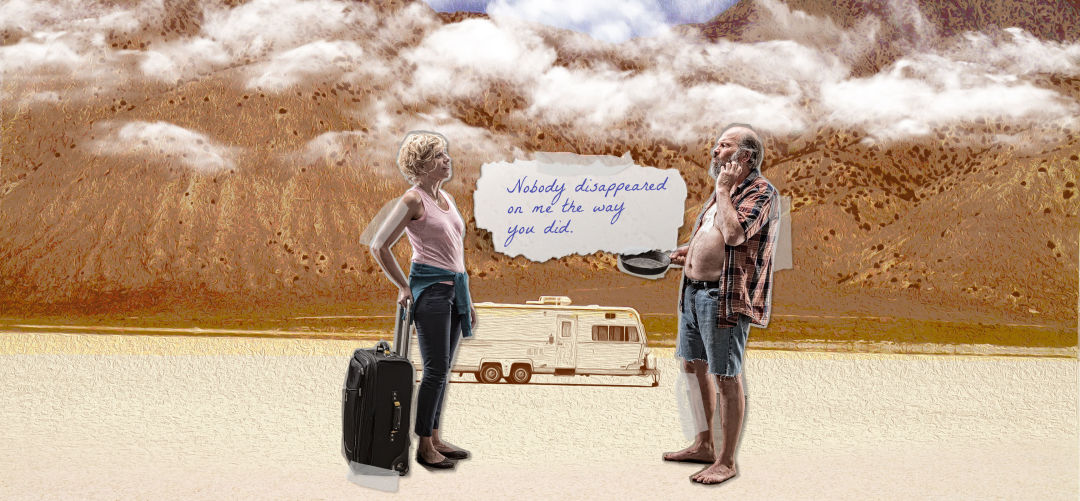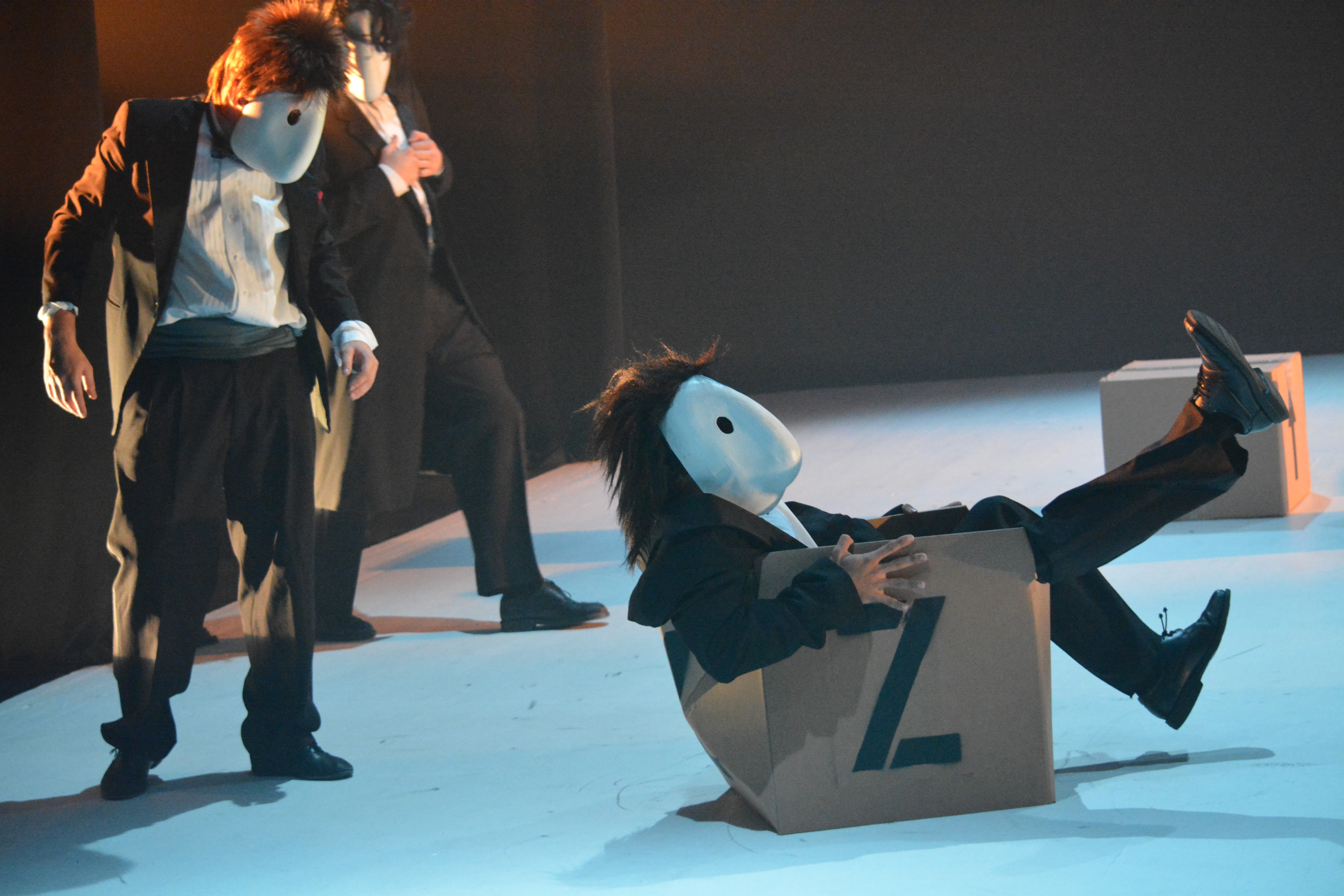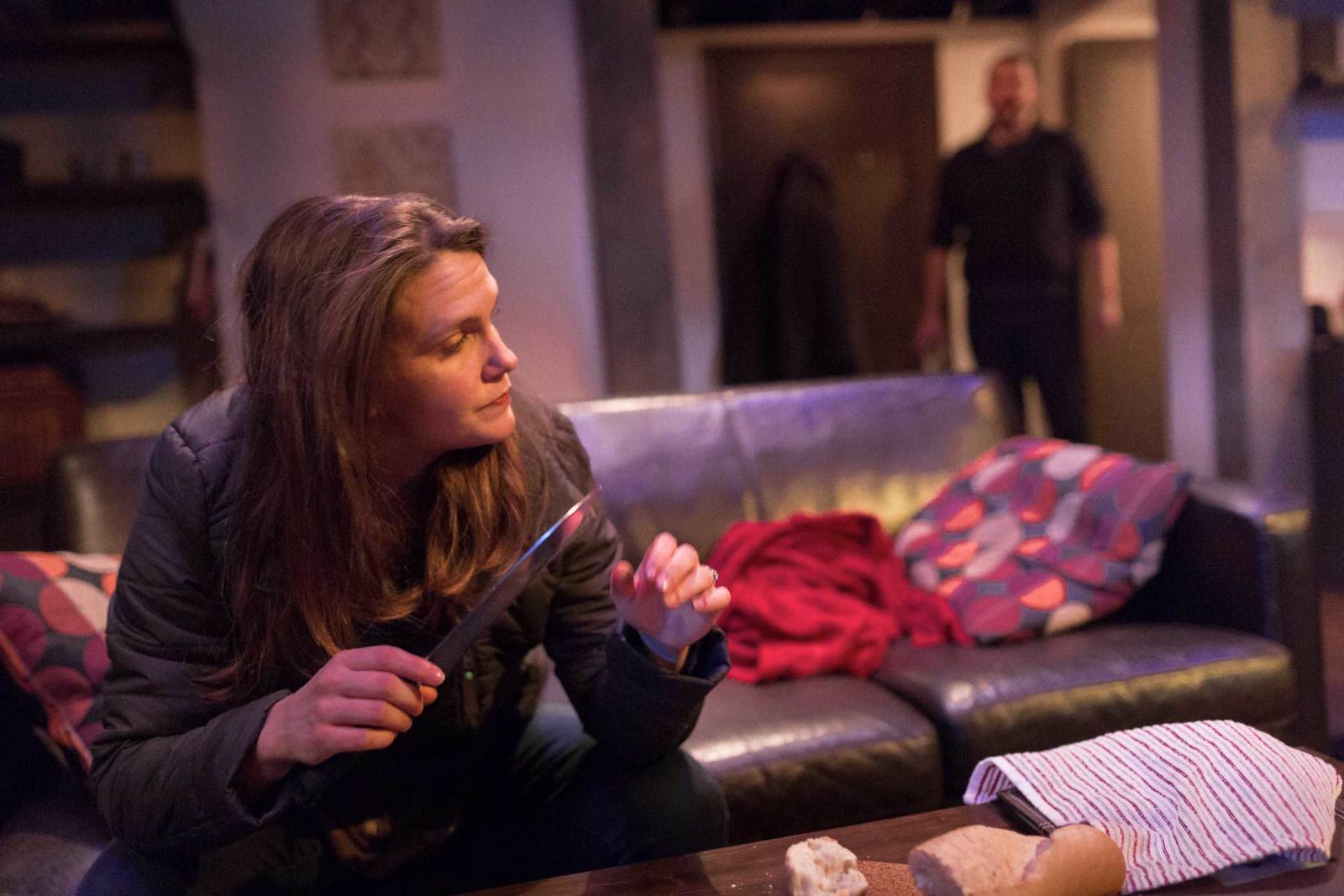Third Rail Distills the Drama to Two People in a Trailer—Weed Optional

Karen Trumbo and Bruce Burkhartsmeier in Annapurna. Design credit: Rene Choy
Image: Owen Carey
Think theater and your mind probably goes directly to high drama, big budget, serious stage production. But, says Third Rail’s Isaac Lamb, the heart of theater is really the human connection: actors connecting with their characters, audiences connecting with actors. Live theater is an exercise in empathy and often in catharsis.
And theater doesn’t get much more cathartic than Lamb’s newest directorial project: Sharr White’s Annapurna. It’s the story of Emma and Ulysses, 20 years after Emma left in the middle of the night with their son. Now she’s come to find her former husband. As he dies of emphysema in a dirty trailer in the mountains, the topography of their relationship unfolds before the audience: the love, the loss, the connection and isolation. At turns heartbreaking and funny, it is not just a story of love lost, but of the human connections that we all crave and sometimes fail to make. It opens at Third Rail Repertory Theatre in the Imago building this weekend.
We talked to Lamb—who has directed award-winning plays around Portland, though this is his directorial debut with Third Rail—about his production of Annapurna, Third Rail’s future, and why we have Donald Trump to thank (no, really) for Lamb’s return to Portland.
You’ve previously directed more complex productions, such as Adrift in Macao and Band Geeks! But Annapurna is just two people in a room. What drew you to this play?
I’m still developing a sense of what I like when it comes to directing, but I’m usually drawn to productions that play with form and narrative—productions that are challenging in terms of construction. Annapurna is the simplest form of theater: just two people in a room, and I was surprised by my reaction to it. What it boils down to is that it is connected to the essence of the art form: the human being.
Your domestic life is kind of famously happy. [Lamb publicly proposed to his now-wife and the video went viral.] Do you think your personal life—which seems, on the surface, vastly different from Emma and Ulysses’ life—played a role in how you’re telling this story?
Absolutely. My personal experience has an enormous effect into how I move through this play—but not the part people expect. I was born to divorced parents—they split up when I was in utero—and my biological father was a complicated man, an alcoholic, and a difficult personality. We never achieved closeness before he passed away, and so many parts of Ulysses remind me of my dad, who, in many ways, burned very brightly but was also very flawed. And Emma is this incredible, generous and compassionate and tough as nails woman, and is in many ways the hero of the story. She reminds me so much of my mom. I come at this play from the angle of the son, who we never really meet but who we hear a lot about. It’s been a way for me to think about and honor and work through my own heritage.
Have you made any directorial choices that depart either from Sharr White’s script or from the original production in San Francisco in November 2011?
I haven’t departed from anything that’s highlighted in the script, but the one thing that I did—I took a stab at the setting. It’s still a trailer. But we are staging it in alleyway staging: audience on both sides of the trailer. Most other productions we’ve seen or heard of—and it’s sort of written this way—are put on as end-stage plays where you’re just looking at it in a traditional setting. But he also put a stage direction in the play that says that at any point, design choices should be made to reduce the distance between the audience and the actors. So I thought the best way to do that in the Imago space was to put the audience on both sides, reduce the distance of the back rows, and make it feel like everybody who is in the theater is in that trailer.
Why should people see it?
I think it’s rare that we get the opportunity to see roles written for actors of a certain age to carry a show with as much depth as this show has—and bare themselves as intimately as these two have. They have to bare themselves on stage—sometimes physically and sometimes emotionally. I think it’s rare to see people like Karen [Trumbo] and Bruce [Burkhartsmeier], who have been fixtures of the Portland theater scene for 25 years, given roles like this, and we get to watch these two titans duke it out on stage. It’s kind of like having DeNiro and Pacino on stage. You just gotta put them in a room and watch them go at each other.
With Imago announcing that they're selling their building, what’s the future of Third Rail?
There’s a lot up in the air. We’re trying to be deliberate in either finding a way to stay in that space or finding a permanent space. We’re tired of moving. We have a year, and we are currently trying to find partnerships, donors, interested parties who might be able to put together a coalition to help us potentially either buy the building or throw our hats in the ring in the development side of it.
We’re exploring a lot of options right now, but it’s an uncertain time. If anything, we are one of the canaries in the coal mine. If Portland can’t sustain mid-level or mid-sized artistic organizations—if all we can sustain are the big five art organizations—our arts ecology is just not healthy. As a community, we need to think about making it possible for organizations of our size able to afford space.
No matter what, this is not the end of Third Rail. We’re going to keep producing theater. It’s too committed and too passionate a group of people to stop working on the stuff that we love so much.
Anything else our readers might like to know?
We’re teaming up with a recreational weed co-op. We're in talks to breed a particular strain for each one of our shows and pair them up. [Annapurna] will be our first run at that. For anyone interested in partaking, it’ll be a fun and interesting way to experience the show.
So can you buy it at the theater?
You can get a voucher that gives you a discount, or you can go on their website, show them your ticket, buy it and bring it to the theater. It's a mutual discount of 10 percent for customers of both organizations. We’re even considering doing a night that’s like a safe night. For people who get a little nervous going out in public when they smoke weed, we’d have a night where it’s, like, “Weed smokers, come and see the show!” We’re just trying to find new and fun ways to engage audiences.
Finally, rumor has it your route to acting and directing came via reality television. . .
I started acting in high school—always loved it. But I went away to school to become a filmmaker. That’s what I thought I wanted. I ended up working on the first season of The Apprentice when I got out of film school. [Donald Trump] is an insane person. I’ve seen the behind-the-scenes footage to prove it.
My job was awful. I was a transcriber. I would sit in what they called the pit all day and transcribe all the sit-down interviews. So I just saw hours and hours of footage of him and all those crazy people on that show. It was miserable.
So he’s an actual insane person? It’s not an act?
He is an actual insane person. I hate to break it to the world.
Annapurna runs August 5–27 at Imago Theatre.




